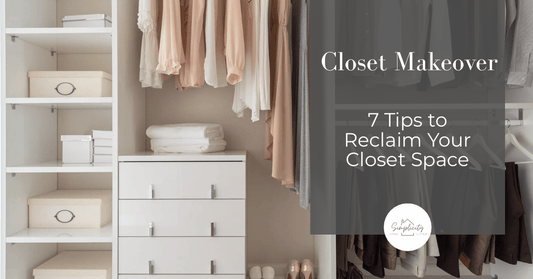Wholesale shopping at stores like Costco and BJ’s has become a lifeline for families looking to save money and stock up on essentials.
Buying in bulk is easy; storing bulk items is the real challenge. Where and how do you stash all those jumbo packs of toilet paper and paper towels without your home feeling like a warehouse?
Here are some practical tips to help you store your bulk purchases efficiently, whether you have a spacious garage, a tiny closet, or an unfinished basement.
1. Know Your Usage of Bulk Goods
What to Do: Before you even buy, figure out how much toilet paper and paper towels your household uses in a month. This will help you decide how much to stock up on, whether its 6 months or 3 months etc.
Keep in mind that wholesale stores often tempt you to buy more than you need. Some times the feeling of over abundance leads us to over use things.
Knowing your usage will help you buy what you need & use what you need.
Pro Tip: Buy the bulk items when they're on sale! This is how you'll get real savings. Sometimes Costco runs great discounts on toilet paper, paper towels, diapers etc. Keep your eye on their monthly sales and plan accordingly.
2. FIFO - First In First Out
What to Do: Organize your bulk items using the FIFO method—First In, First Out—to ensure older items are used before newer ones. Label shelves or bins with the purchase date and arrange items so that newer stock is placed behind older items. This works especially well for bulk paper goods, cleaning supplies, and pantry staples.
Pro Tip: Add reminders to check expiration dates periodically and rotate your stock when you buy new items.
Benefit: Reduces waste, prevents over spending, ensures your items remain fresh and usable, and helps maintain an efficient and organized storage system.
3. Only Open One Pack at a Time
What to Do: To keep things tidy and manageable, only open one pack of paper towels or toilet paper at a time. Store the rest of your stash in its original packaging until it’s ready to use.
Benefit: Reduces mess and helps you keep track of how much you have left before opening another pack.
4. What to Do Once You Open a Pack
What to Do: After opening a bulk pack, organize the individual rolls for easy access. For toilet paper, stack rolls in a nearby cabinet or place them in a decorative basket. For paper towels, keep one roll on the dispenser and store the extras in a utility closet or pantry. It's kind of like baseball; having one up to bat at plate and the next couple on deck.
Pro Tip: If you have kids, involve them by letting them "restock" the bathroom or kitchen. It’s a simple chore that teaches responsibility while helping you stay organized.
Benefit: Keeps your space functional and ensures you’re not scrambling for supplies when you need them most.
5. Use Sturdy Shelving
What to Do: Listen, if you don't have any sort of Heavy Duty Shelving, get it today! Having durable shelving is key to getting your home organized, not just for bulk items but for much more. Buy heavy duty shelves and set them up where you want to store your bulk items, in your garage, basement etc.
If storing in an unfinished basement, garage, or utility room, sturdy shelving units keep items elevated and protected from moisture or pests.
Pro Tip: Store heavier items like canned goodd or flour on the lower shelves for safety, and reserve the higher shelves for lighter items like toilet paper.
Benefit: Makes the most of limited storage space while keeping everything accessible.
6. Monitor Your Stock to Make Sure No Pests Get In - Store Bulk Food in Plastic Bins
What to Do: Regularly check your bulk storage for signs of pests, such as chewed packaging, droppings, or damage. My family recently learned this lesson the hard way when we went to use a big bag of rice we had just purchased, only to find it had been gnawed into by a mouse.
Which leads me to our....
Pro Tip!!: If you're storing bulk non-canned goods like rice, flour, or snacks in an unfinished basement, garage, or utility room, invest in these sturdy plastic bins with tight-fitting lids to keep mice and other pests out.
For added protection, place traps or pest deterrents near storage areas as a precaution.
Benefit: Keeps your supplies safe and usable while saving you from the frustration (and expense) of replacing ruined items.
7. Check Your Inventory Before Going Shopping
What to Do: Before heading to the store and buying yet another 30 pack of paper towels, take a quick inventory of your bulk items to see what you already have on hand. This not only prevents overbuying but also ensures you’re aware of what might be running low. Use a checklist so you don’t accidentally stock up on something you don’t need while forgetting essentials.
Pro Tip: After checking on your supply, make a list of what you need before heading out and stick to it!
Benefit: Saves money and reduces waste by avoiding duplicate purchases, while ensuring you never run out of the items you need most.
Why Wholesale Shopping Is Booming
Stores like Costco and BJ’s are more popular than ever, offering significant savings for families willing to buy in bulk. But the true cost of bulk shopping isn’t just the membership fee—it’s the space you’ll need to store all those items. By knowing your usage, keeping your stash organized, and storing smart, you can enjoy the perks of wholesale shopping without turning your home into a storage unit.
Final Thoughts
With these products storage and organization tips, you can keep your bulk purchases organized and accessible without sacrificing your living space. Whether you’re working with a small closet or an unfinished basement, a little planning goes a long way in making bulk shopping work for your household.
What’s your favorite bulk storage hack? Share it in the comments and subscribe for more practical home organization tips!











1 comment
Smart organization is key to efficiency, and this guide nails it! Perfect tips for managing bulk items effortlessly while saving space and time. A must-read for both homes and businesses looking to stay organized. https://saveplus.ae/